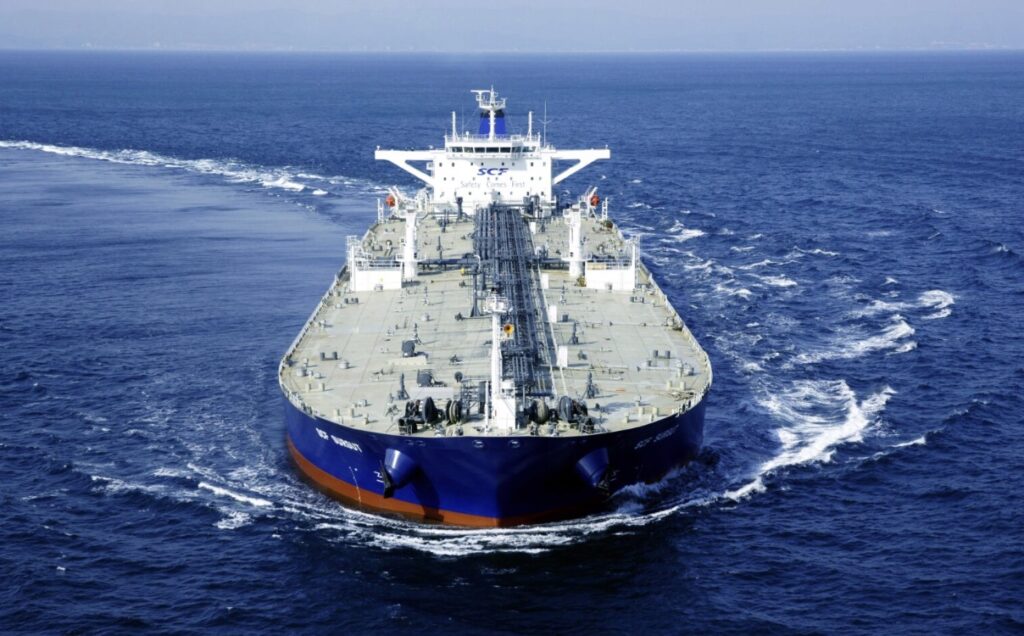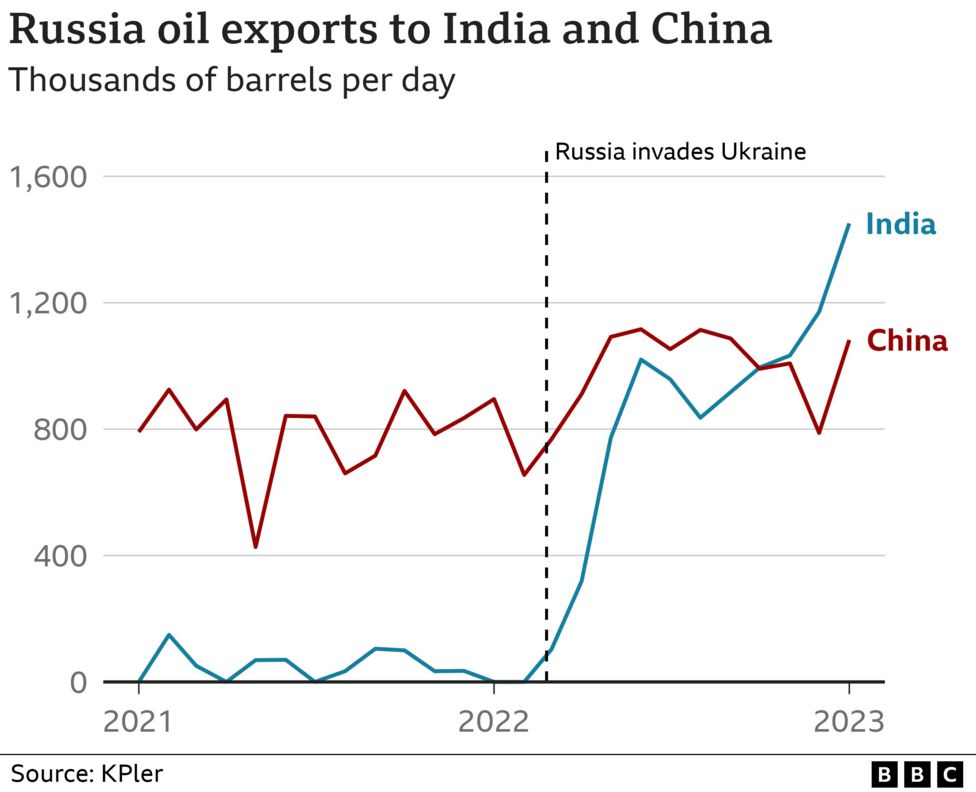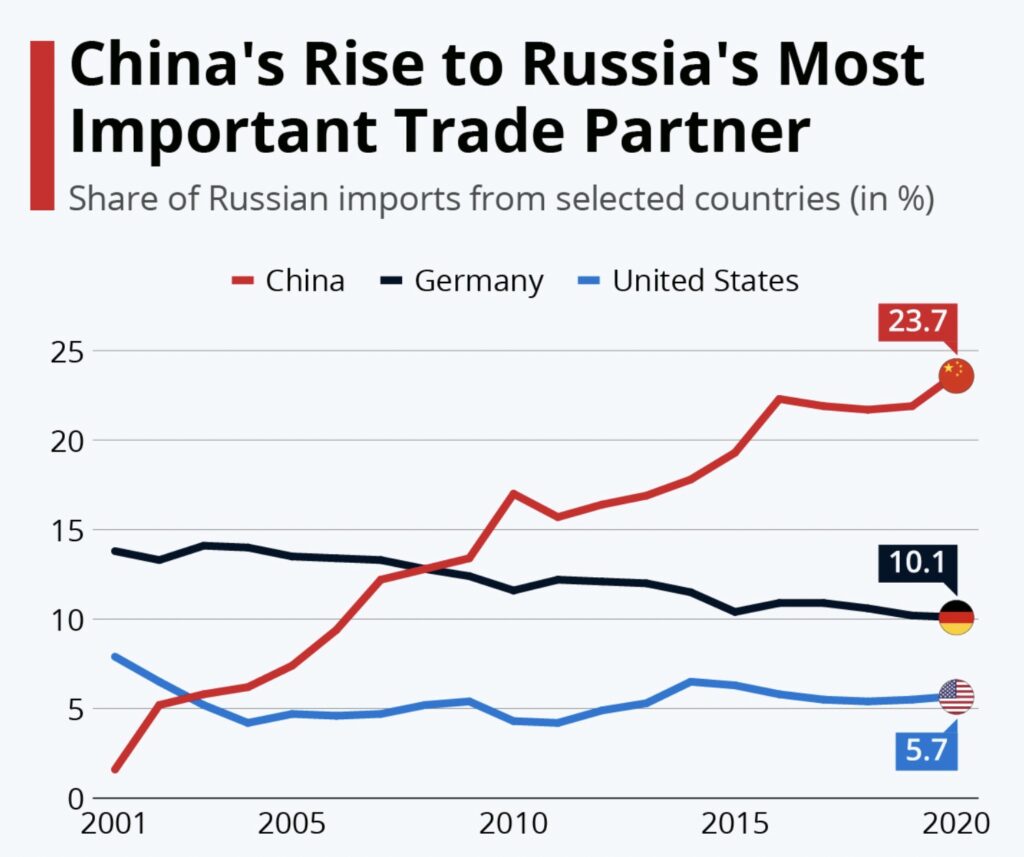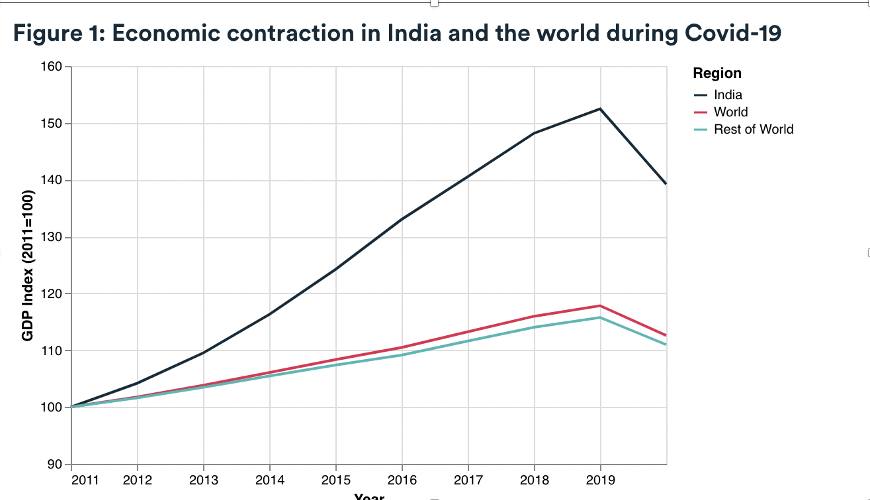The Ethics of India Buying Russian Oil
By Lucy Ingold

Following Russia’s invasion of Ukraine, India has been torn between its respective relationships with Russia and the West. Both partnerships offer certain downfalls for historically non-aligned India. Russia has long been India’s primary military defense technology supplier. Russia, however, has a budding relationship with China, which India is currently engaged in a border conflict with. Should a war break out between China and India, India cannot guarantee Russian support. However, India is wary of growing closer to the West, partially due to not wanting to mortgage its freedom to alliances with Western powers after years of colonial rule. India also believes alliances with these countries don’t always fare well for developing nations. The debate over the authenticity of Indian democracy, galvanized by the Indian government’s treatment of its Muslim population, also suggests Indian and Western values don’t entirely align.
Rather than fully commit to either partnership, India has decided to navigate the conflict via pursuing its national economic self-interest by buying Russian oil and abstaining from condemning the war. Western nations have criticized India taking advantage of Russia’s discounted energy as ethically wrong. From a global perspective, the increase in India and China’s purchasing of Russian oil post-invasion has countered the effect of Western boycotts on Russian crude. Although India’s justifications will be examined, their longtime relations with Russia do not ethically justify India supporting a country that has done something morally reprehensible. India has undermined the effect of Western sanctions on Russia, fueling Putin’s war effort and the humanitarian crises in Ukraine. India therefore bears some ethical responsibility for the continued destruction of Ukraine and the deaths of its citizens, making India’s actions unjust.
India’s involvement with Russia Post Ukraine Invasion
Russia invaded Ukraine on February 24th, 2022, the most aggressive move in the ongoing Russo-Ukrainian War. Historically, Russia has not been a major oil supplier to India. However, in the months following the invasion, India progressively increased its purchases of Russian oil. In February, India was only importing 100,000 barrels of Russian crude oil a day compared to 870,000 barrels per day (bpd) by May, growing to 1.25 million bpd in December 2022, an all-time high. Overall, over 60 million barrels of Russian crude have been imported to India in the first half of 2022, compared to a mere 12 million barrels in all of 2021. Russia now serves as India’s second-largest oil source, following Iraq. India is partially incentivized to buy Russia’s Ural crude oil because it offers large discounts of up to $35 of the global average oil price. India argues that as a developing country, it does not have the luxury to ignore the opportunity to buy discounted energy. As an ethical justification, this argument somewhat holds up considering the United States and powerful Western European countries cannot expect India to have the same ability to shoulder higher global oil prices. India can refine the highly discounted crude oil it imports, and export the products worldwide with double profits. For example, India is currently exporting 685,000 barrels of diesel per day compared to pre-invasion figures of 580,000 per day.
Meanwhile, member nations of the European Union, the longtime primary market for Moscow’s oil exports, agreed to stop most oil purchases by the end of 2022. The United States claims that India’s increased Urals imports open New Delhi up to a “great risk” as Western countries enforce ever more sanctions on Moscow. Currently, there are no US sanctions against Russia which prevent other countries from buying Russian oil.

In addition to their significant increase in Russian oil purchases, India abstained from a vote at the 2022 United Nations Security Council to condemn Russia’s invasion. The two countries have had a working relationship for a long time, beginning with the signing of the “Indo-Soviet Treaty of Peace, Friendship, and Cooperation” in 1971. The treaty was not a full-on alliance, but it did propel Moscow to become India’s number one arms supplier. Although India has been diversifying its military suppliers, down from 75% Russian supplies in the first half of the last decade to 45%, the two powers continue to work together. India has even recently been finding a growing export market of food and medicine to Russia. Understandably, India feels a certain allegiance to Russia due to their longtime trading connections, making it easier to justify supporting the Russian war effort. However, despite their longtime relationship and the benefits India is reaping from discounted Russian oil, Russia’s growing collaboration with China creates an uneasy justification for Russia as a solid Indian partner.
China/Russia Relationship is an Issue for India
Tensions between China and India stem from several disagreements regarding the 4000-kilometer border between the two countries – the amount of disputed territory is greater than any other border dispute in the world. 2020 saw an outbreak of violence between Indian and Chinese troops in the northern border zone of Ladakh. The fighting left twenty Indian troops dead. China also claims the entire eastern state of Arunachal Pradesh to belong to them. The region has historical, cultural, and strategic significance to China – the state contains a Buddhist town with a Taiwanese monastery and was also the birthplace of a Dalai Lama. China’s claims mirror Putin’s justification of the Ukraine invasion – the dispute offers true potential for invasion.
At this moment, it is believed that a combined 100,000 troops have been deployed to the China-India border by both sides. India has banned the Chinese app Tik Tok along with dozens of other Chinese applications and software. In 2022, China’s foreign minister visited New Delhi under the guise of trying to get Sino-Indian relations back to normal, but India’s foreign minister defended India, saying that could not happen without China stepping back from the border. However, China would have the upper hand in any military conflict. China is the bigger power with an economy six times larger than India’s, defense spending four times greater than India’s, and more global clout and diplomatic power. Furthermore, China’s good relationship with Pakistan, another neighbor of India’s, leaves India increasingly vulnerable and surrounded. India continues to trade with China at almost $100 billion a year, most of which is in China’s favor with 80% of the trade consisting of Chinese exports to India. Thus, as China grows closer to Russia, India must be cautious in working with Russia moving forward. India would also be wise to rethink their current involvement with Russia should they want global aid in the event China attacks Arunachal Pradesh. India’s high purchasing rates of Russian Urals Crude dismays Western counterparts. India likely remains favored over China by Western countries, but India financially fueling the Russian war effort is possibly diminishing the extent to which the West would step in should a Chinese invasion occur. India’s current profiting off Russian oil could come back to bite them.
China and Russia Relationship
China is currently Russia’s primary Asian partnership. Russian President Vladimir Putin met with Chinese President Xi Jinping shortly before the invasion of Ukraine and issued a lengthy statement announcing a “no limit” partnership and plans to create a new world order guided by “democracy.” Western intelligence has reported that China was even alerted to Russia’s invasion plans and asked Russian officials to delay the invasion until after the Olympics. However, this has not been confirmed. Over January-November 2022, China’s crude imports from Russian rose 10.2% year on year to 79.78 million mt, or 1.75 bpd, customs data showed
China, for its part, has been careful not to fully align with Russia post-invasion. On the one hand, Beijing has asserted that NATO is at fault for the invasion due to its pushing eastward and has refused to fully condemn Moscow. On the other hand, China and Ukraine enjoy a positive relationship. China has not publicly provided military assistance to Russia yet, but the US reports that it may send lethal arms to Russia soon. China denies a parallel between Taiwan and Ukraine – Chinese officials claim only fourteen nations recognize Taiwan as independent whereas most of the world recognizes Ukrainian sovereignty.
Russia and China, despite their “strategic partnership,” are also not on equal footing. China’s economy is the second largest in the world and continues to grow, whereas Russia’s economy is eight times smaller and is currently contracting due to the war effort. China has a population of 1.4 billion, compared to Russia’s smaller 142 million population. China spent $293 billion on its military in 2021, whereas Russia only spent $65.9 billion. China is overtly the bigger power in this partnership, and thus Russia will have to pay more attention to China’s strategic interests. The dynamic of China calling the shots is likely to only be exacerbated as Russia is weakened by its war with Ukraine. Thus, India should be wary of working too closely with Russia. If a worst-case scenario, nuclear war broke out between India and China, India knows it cannot depend on Russia for the support it would need. India’s purchasing of Russian oil can therefore only be justified as a profitable economic deal rather than supporting a loyal ally. From an ethical standpoint, protecting human lives and global democracy should take precedence for a democratic country like India.

India’s Relationship with the West
India and various Western powers enjoy largely positive relationships. The Quad, which consists of the United States, India, Japan, and Australia is a partnership between the main Indo-pacific democracies. Their goal is to reinforce Democratic principles in their spheres of influence. For example, they hold regular naval exercises to remind neighboring countries, namely China, that crucial shipping lanes must remain free. However, The Quad has no security component and India remains reluctant to break its history of non-alliance and align formally with any of these powers. India is also currently in free-trade negotiations with the European Union, United Kingdom, and Canada.
Obstacles stand to prevent India from being pulled more tightly into the sphere of Western powers. India is frustrated with a lack of Western commitment to supplying India with the military defense technology it needs and to supporting the development of an Indian defense industry. Western powers refuse to provide India with the same defense assistance it currently receives from Russia – for example, the United States even threatened sanctions against Russia for supplying S-400 air defense missiles and parts for Russian-styled tanks to India. Thus, India has little incentive to disengage from purchasing weapons from Russia. India ethically justifies buying Russian Urals crude by arguing Russia has been a far more generous arms trade partner than the United States. However, supporting Ukraine is more than just playing towards the West, it’s about taking a stand against a humanitarian crisis.
Furthermore, after 200 years of foreign rule, India is hesitant to mortgage its political and military freedom to Western powers through an alliance. However, many more newly sovereign countries enjoy great relationships with their former Western colonizers. For example, in a 2019 poll a majority of Philippine citizens cited the United States as their best ally. The Ukraine invasion would suggest Russia has done far more to unjustly infringe upon a sovereign, democratic state’s political and military freedom in post-World War II history than any Western power. India citing colonialism as an active reason why a current alliance with Western countries would go poorly, espouses an outdated justification.
The reluctance towards greater Indian-Western unity is not only felt by India. India’s recent actions towards its Muslim population have left Western countries unsure of shared values. Narendra Modi, Indian Prime Minister and leader of the majority BJP party has long been accused of encouraging Islamophobia in India. Two decades ago, when Modi was president of his home state Gujarat, he was accused of condoning violence toward Muslims. This manifested in a series of riots in Gujarat in which 2000 citizens, mainly Muslims, were killed. Following this incident, the United States refused to give Modi a visa in 2005 on grounds of “severe violations of religious freedoms.”
More recently in 2019, during Modi’s second term as Prime Minister, the Indian government took away the semi-autonomous status of Kashmir, India’s only majority Muslim state. Kashmir was placed under lockdown and internet links were cut, local politicians were arrested, and media access was limited. Shortly after, the government passed a Citizenship Amendment Act which offered a fast track for Hindus to become Indian citizens but did not extend the same privilege to Muslims. The United Nations called the act “fundamentally discriminatory” and a series of riots erupted in New Delhi. More recently in 2022, several Muslim-owned properties in New Delhi were demolished by government authorities, although the Indian government denies a correlation between religion and property destruction. Questions surrounding the authenticity of Indian democracy have also arisen in relation to claims India’s majority BJP party has deep ties with Indian media and business powers. Thus, the West faces its own ethical dilemma when working with India. The belief of these powers being united by shared democratic values seems unsupported. India is unlikely to step down from purchasing Russian oil out of loyalty to Western countries.
Impact of COVID-19 on Indian Economy
India’s economy was heavily impacted by the COVID-19 pandemic. From April to June 2020, India’s GDP dropped by 24.4%, followed by another 7.4% drop in the second quarter of the 2020/21 year. In real terms, India’s overall rate of economic contraction was 7.3% for the whole 2020/21 economic year – the worst in the country’s history. Furthermore, India suffered a greater economic decline at the hands of COVID-19 than many other developed and undeveloped countries. India saw a high unemployment rate of 23.52% during the height of the pandemic, although it has since decreased to normal levels. The number of poor in India is expected to have doubled throughout the pandemic. Rural poverty increased by an estimated 9.3% and urban poverty by 11.7%. The actual increase is expected to be even larger. These percentages translate to an estimated 230 million people falling under the poverty line during the pandemic.
With an eye toward post-COVID economic recovery, buying discounted energy from Russia is understandably an extremely appealing opportunity for India. India ethically justifies these purchases by arguing it is necessary for a country economically ravaged by multiple COVID-19 waves, which lacks the wealth and health resources of Western powers, to pursue a lucrative economic deal. However, India’s GDP rebounded by 9% in the 2021 fiscal year, and economists predict Indian real GDP to grow 8.2% in the 2022 fiscal year. The country is recovering well from the economic setbacks inflicted by COVID-19, independent of its profiting from Urals crude. India does not require discounted Russian energy for economic survival. This justification is untenable.

Evaluation of India Buying Russian Oil
India, caught between Scylla and Charybdis, is in the difficult position of not having a clear ally in either Russia or the West. Although Western powers, including the United States, have expressed desires to strengthen their partnerships with India, India is right to have trepidations. Alliances between the United States and Asian countries have not always fared well for the latter. The same can be said for alliances with European countries. Furthermore, Western countries remain unwilling to offer India the full military support it believes it needs to secure its border with China. Russia, on the other hand, has continuously offered India these military resources. India is also a fundamentally different nation from Western countries, given that it was under colonial rule for roughly 200 years. Questions surrounding the authenticity of Indian democracy, particularly towards religious freedom, also suggest current cultural and political differences. Political experts suggest India is more united with the Western hemisphere by a desire to halt Chinese expansion rather than shared values, shaky grounds for a precarious partnership.
Russia, however, does not offer itself as an excellent partner to India either. Although the two countries enjoy largely positive relations, strengthened most by their arms trade, India realizes the unreliability of Russian loyalty. As Russia and China solidify their relations and release public statements expressing an intent to continuously grow closer, India should be wary. Russia does not have the economy, global clout, or military power to compete with China and thus suffers from an inferior position in their relationship. With tensions nowhere near dissolving between India and China, India cannot expect undivided Russian support should a war break out. India would also benefit more from Western support in the event of a Chinese invasion than support from a war-weakened Russia. Thus, it is unclear whether Indian interests are best supported by a move closer to Russia or the West. With no clear partner to turn to, India is left mainly to focus on their own best interests. This manifests in India refusing to condemn Russia’s invasion of Ukraine, to not isolate Russia, and taking advantage of the economic opportunity offered by discounted Russian oil.
Yet, it is intrinsically wrong for India to turn a blind eye toward the brutality of Putin’s invasion and continue to economically support the Russian war effort by buying Russian oil. Russian crude oil sales to Europe decreased by 554,000 barrels a day. The uptick in oil exports to China and India has completely saved the Russian oil business. Russia even earned $1.7 billion more in oil revenue in May than in April, allowing Putin to continue his war effort. The US State Department official Amos Hochstein expressed the ethical issues of purchasing Russian oil to India, saying it looks like “you’re taking advantage of the pain that is being felt in European households and the US.” From India’s point of view, however, there is little ethical fault in continuing to support a longtime partner and friend.
Indian discrimination against its Muslim population would also suggest a differing perspective on humanitarian issues, perhaps one that is more tolerant of the Russian invasion. By also viewing itself as a developing country, India can justify not taking the same stand against Russia as the Western countries because it cannot afford to boycott the Russian economy. Despite these justifications, India is currently behaving in a morally reprehensible manner. Russian missile strikes on Ukraine have caused civilian casualties and destruction of civilian infrastructure. The number of civilian casualties has surpassed 18,000. Over 12 million Ukrainians have been displaced. Numerous Russian war crimes are recorded every day. About 8.7 million people in Ukraine require humanitarian assistance. Ukraine is a top producer of wheat and barley, and a wave of global high prices for essential food commodities is expected to endure for years. These simple figures don’t come close to painting a full picture of the devastation Ukraine, and the world, has and will continue to face because of the Russian war. Combined, India and China increased their oil purchases replacing the drop in Russian oil exported to Europe. India’s actions have directly undermined Western attempts to impede the Russian war effort. India should be held morally responsible for its actions which directly allow the humanitarian crisis unfolding in Ukraine to continue.
Sources
Dhingra, Swati and Maitreesh Ghatak, “How was Covid-19 affected India’s economy?” Economics Observatory, June 2022.
https://www.economicsobservatory.com/how-has-covid-19-affected-indias-economy
Huang, Eustance, “Take China and Russia’s ‘no limits’ relationship with a ‘grain of salt’ says former PBOC advisor”. CNBC News, March 2022. https://www.cnbc.com/2022/03/31/take-china-russia-no-limit-relationship-with-grain-of-salt-li-daokui.html
“India’s economy back on track post-pandemic, Ukraine war”. Deccan Herald, May 2022.https://www.deccanherald.com/national/indias-economy-back-on-track-post-pandemic-ukraine-war-moodys-1110371.html
“India’s geopolitical dilemma: How India and Russia got so close”. DW News, June 2022. https://www.youtube.com/watch?v=9ASkO-f0wFM
“India’s geopolitical dilemma: Why China wants to take India’s territory”. DW News, June 2022. https://www.youtube.com/watch?v=Iz_JdQSrzBg
“India’s geopolitical dilemma: Why India & the West are wary of each other”. DW News, June 2022. https://www.youtube.com/watch?v=OshZy7fhJKo
Kanwal, Sanyukta, “Impact on unemployment rate due to coronavirus lockdown in India from January 2020 to May 2022”. Statista, June 2022.
https://www.statista.com/statistics/1111487/coronavirus-impact-on-unemployment-rate/
Kim, Victoria and Clifford Krauss, “Asia is buying discounted Russian oil, making up for Europe’s cutbacks”. New York Times, June 2022.
Kurtenbach, Elaine and Krutika Pathi, “India, China growing markets for shunned Russian oil”. AP News, June 2022.https://apnews.com/article/russia-ukraine-politics-business-china-middle-east-b6a90423ee7e2245e3eafc713083896f
Maizland, Lindsay, “China and Russia: Exploring Ties Between Two Authoritarian Powers”. Council on Foreign Relations, June 2022. https://www.cfr.org/backgrounder/china-russia-relationship-xi-putin-taiwan-ukraine
Menon, Shruti, “Ukraine Crisis: Why is India buying Russian oil?” BBC News, June 2022.https://www.bbc.com/news/world-asia-india-60783874
Reed, Stanley and Emily Schmall, “India finds Russian oil irresistible, no matter the diplomatic cost”. Forbes India, May 2022.https://www.forbesindia.com/article/news/india-finds-russian-oil-irresistible-no-matter-the-diplomatic-cost/76013/1
“GDP Growth (annual %) – India” https://data.worldbank.org/indicator/NY.GDP.MKTP.KD.ZG?locations=IN
Verma, Nidhi, “Russia jumps to fourth position as oil supplier to India, tanker data shows”. Reuters, May 2022. https://www.reuters.com/markets/commodities/russia-jumps-4th-position-oil-supplier-india-tanker-data-2022-05-17/
